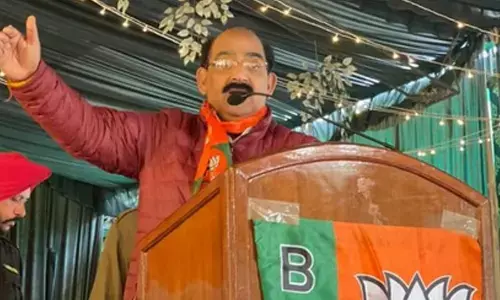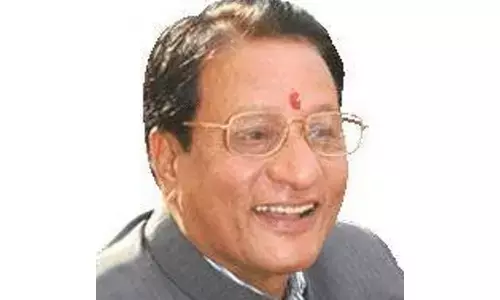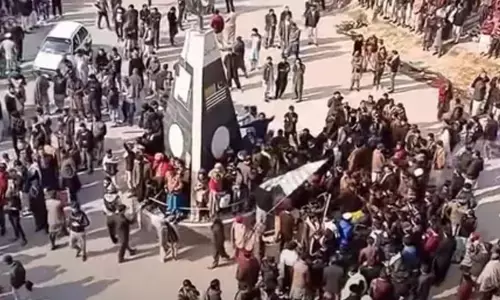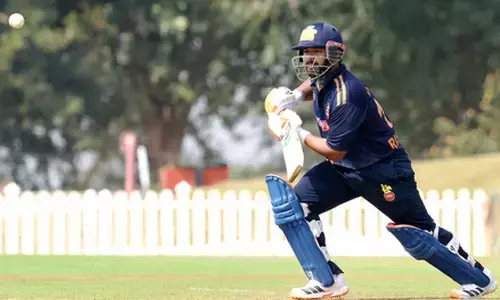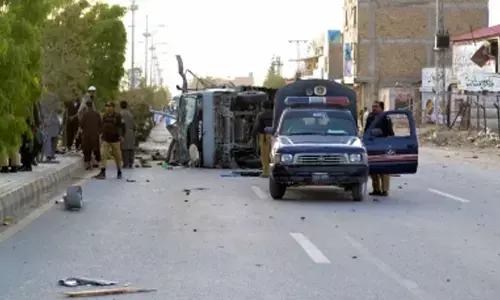MyVoice: Views of our readers 11th December 2022

Views of our readers
Poll results show fascist rule turns bitter or sour but not sweet
Ramu Sarma's bold talk depicts a rhythmic caption 'Bhupendra defeats Narendra' (Dec. 10) which means the former secured more votes now than latter in Gujarat elections earlier. The total narration of the essay concentrates on analysing the poll verdicts in Gujarat, Himachal Pradesh very appropriately. Seventh term win without gap in assembly elections in Gujarat by amassing majority seats is credited to undiminished charisma of Narendra Modi he is maintaining right from Chief Minister of Gujarat and being continued power as PM now in Delhi. But his cuteness could not work in Municipal Corporation of Delhi elections.
AAP grabbed BJP's regime which evidences the good governance of Kejriwal. In Himachal Pradesh polls also BJP was thrown out of power by Congress Party and that cost the post of BJP President JP Nadda for taking unwise decisions in his own State. The poll results revealed that one person's undisturbed said to be a fascist rule for two terms at centre turn bitter or sour but not sweet that adjudicated in polls by demolishing in MCD and Himachal Pradesh. BJP lost two and won one. Any amount of laxity in dealing with people's problems in longer time will reflect in the way it is seen in poll verdicts.
N Ramalakshmi, Secunderabad
II
Gujarat, home state of PM Modi, has retained its government with 156/182 and in Himachal Pradesh, anti-incumbency factor for BJP is fairly seen with absolute mandate of 40/68 for Congress. These results will have greater impact in Parliament elections to be held in 2024 if not advanced. BJP lost local body elections in Delhi to AAP which has laid its presence in Gujarat assembly. People rejected BJP in Delhi local body polls and once again confirmed good governance of Kejriwal who along with other regional parties may cause lessening of number of seats to BJP in the coming Parliament elections. Bharat Rashtra Samithi from Telangana state will be a new entrant in the fray. Democratic setup is weakening with multiple party system in India.
Dr NSR Murthy, Secunderabad
III
In the midst of Modi momentum, the writer V Ramu Sharma had rightly come out that that to reach out to voters of all class and sections, BJP need to analyse the weaknesses and strengths in depth in order to keep alive the winning momentum leading into the 2024 elections. In this context, BJP's Massive mandate in Gujarat, congress regaining Himachal Pradesh and AAP winning in MCD polls in Delhi is no real surprise at all. However the big story in Gujarat is BJP overcoming anti-incumbency and coming back strongly and captured the places where it had fared poorly in 2017.
But in contrast, true to track record of alternating history in Himachal Pradesh between BJP and congress, congress regained the hill state while AAP hoping to gain on the strength of huge freebie promises failed miserably in Himachal but opened an account in Gujarat winning five seats. Except the triumph in Himachal, congress turned out to be a big loser both in Gujarat and Delhi with vote share dipping significantly. The question arises is to what lies ahead for congress and AAP in Gujarat? The fact remains that Congress and AAP with just a win in Himachal Pradesh and Delhi respectively cannot lie down and rest on the laurels because they need to engage with subaltern groups for its future survival. Nonetheless, the high-energy campaign by Modi in Gujarat presenting development schemes convinced even the most marginalised sections of the society which led to active participation in the recent polls that saw record haul in the state. It is thus clear that BJP goes into 2023 with spirited challenge in Karnataka and three other states that goes for polls in 2023 and lok sabha in 2024. But the worrying factor is how long can Modi carry the bag in future? Therefore, to be part of the winning strategy in Gujarat and for that matter other BJP ruled states, it should induct many young Turks into BJP to keep the party momentum.
K.R.Srinivasan, New Bhoiguda, Secunderabad
Ayurveda is not just medicine but our tradition
Ayurveda is not just medicine but our tradition which we are following from the time immemorial and it is duty of all to preserve the same for our coming generations as it is the ancient India's biggest gift to the world.
The 9th World Ayurveda Congress is being organised by the World Ayurveda Foundation with support of the Union Ministry of AYUSH and Government of Goa. Prime Minister Narendra Modi will address the valedictory session on December 11.
Ayurveda has been facilitated by the setting up of a separate Ministry of AYUSH, Indeed the AYUSH ministry was formed to give fillip to the alternative medicines especially Ayurveda. More than 5,000 delegates and 200 delegates from 30 countries are attending the congress. Though conclaves like this do help, the minister and the government at large should understand that it takes more than just words to make a system popular.
The Ministry of AYUSH, is responsible for developing education, research and propagation of traditional medicine systems in India. The Department of Indian Systems of Medicine and Homeopathy (ISM&H) was made into a ministry by the Modi Government in 2014. It started with much fanfare but it's results are still awaited. Everyone knows the miracle values of Sanjeevani booti and needs no further elaboration and there are numbers of miraculous plants in Indian system of medicines and recently in this regard WHO had opened research centre at Junagarh Gujrat.UNO had also declared June 21 as world Yoga Day and almost all countries had supported this proposition leaving aside their religious affiliation.
Yash Pal Ralhan, Jalandhar
Stopping scholarships to poor minority students is not right
Recently the Union Government has stopped scholarships to minority students studying in Madrasas for class 1 to class 8. The Union Government has discontinued the Maulana Azad National Fellowship (MANF) which was for students from minority community saying it overlaps with the other scholarships. Now Modi Government has discontinued it by citing strange overlaps. The Government's justification that this was done to bring the minority affairs ministry of social justice and empowerment and ministry of Tribal affairs is not justified. MANF was launched by the earlier UPA Government at the Union in an effort to implement the zonal recommendations of Sachar Committee, which was established by Manmohan Singh to look into social educational and economic situations of minorities in the country. Now the Government has found a new way to keep poor children away from education by stopping the scholarships to minority students. Congress president Mallikarjun Kharge has rightly said that "snatching away scholarships from poor students is not right. How much will your Government earn or save by snatching away the money from poor students." Infact government should give Educational/Research scholarships and fellowship to all poor students irrespective of religion. Government should think again on its decision for stopping scholarships to poor students.
Zeeshaan. Kazipet
Vizhinjam project: LDF govt finally puts things on track
The protest by the coastal fishermen community at Vizhinjam ended after five months of intense stir against the Adani sea port project - citing environmental and rehabilitation issues, and becoming violent and unprecedented, resulting in the attack and vandalism of the police station there. It is when the state government truly woke from deep slumber in wake of an attack on the police station that caused extensive damage to property and resulted in injuries to 100 policemen, who were outnumbered by 3,000 odd attackers. The Latin Church unabashedly extended unconditional support to the agitation even as the High Court directed protestors against indulging in such activities from stalling the construction work at the project site; and demanded removal of sheds erected by protestors.
The agitation bore the unmistakable similarities in terms of that enacted by the fishermen community at Koodankulam nuclear power plant in Tamil Nadu against the construction and commissioning of the Nuclear Power Plan that was coming up there - with the effective connivance of the Church, inimical and anti-national foreign NGOs. The movement at Koodankulam was efficiently tackled and thwarted by the timely intervention of the then CM of Tamilnadu J. Jayalalithaa. As we all know, The Nuclear Plant is now providing electricity to the country efficiently.
The LDF government in Kerala has now made its resolve clear that the construction work at Vizhinjam will continue, and the project will be commissioned in 2023; and warned the agitating community that any effort by them at stalling the work or closure of the Vizhinjam project will prove untenable as the project is imperative for the state's long term development and growth.
K V Raghuram, Wayanad
Deceitful conversions
The Supreme Court held that acts of charity or good work done to help a community or the poor should not cloak an intention to convert them religiously as payback. The bench, led by Justice M.R. Shah, stated that conversion on the basis of a voluntary belief in the deity of a different faith was different from the belief gained through allurement. The apex court posted the final hearing on the very serious issue of forcible or deceitful conversions in the country for December 12. Everybody has a right to choose their faith but that does not mean luring somebody by giving something. Charity, help, everything is welcome, but within the framework, There should be an end to deceitful conversions. The question whether 'right to convert' comes under the ambit of 'right to propagate any religion' holds fundamental importance to determine the constitutionality of anti-conversion laws. Article 25 talks about the term "propagate" which means to promote or transmit or merely a freedom of expression. There are many cases of incentivized conversions for the poor sections of society in exchange for a dignified social life. After independence, Parliament introduced a number of anti-conversion bills which were not enacted for want of majority approval. Religious conversion gives new identity to the communities converted which in turn leads to social mobility. Hence, anti-conversion amounts to discrimination and a violation of the right to equality. However, inter-faith marriages should not be pre-conditioned with religious conversion. This certainly raises concerns for the majority of society. Also mass conversions for the sake of revivalism should also not be promoted in any way.
C.K. Subramaniam, Navi Mumbai
Border issue raked up for political gains
The decades-old boundary dispute between Karnataka and Maharashtra has once again erupted, and though both states reckon that only a legal and not a political solution is possible, politicians on either side continue to periodically rake up the issue, resulting in a law-and-order situation in border areas each time they do so. In 1966, under pressure from Maharashtra, the Centre set up the Justice Mahajan Commission and its report was to be binding on both states. The Mahajan Commission, which submitted its report in August 1967, recommended merging 264 towns and villages of Karnataka (including Nippani, Nandgad and Khanapur) with Maharashtra, and 247 villages and towns of Maharashtra (including South Solapur and Akkalkot) with Karnataka. Though the report was placed in Parliament in 1970, it was never taken up for discussion.
This time round, the issue has come to focus with Maharashtra Chief Minister Eknath Shinde convening a meeting in his state to review the status of the dispute and deputing two senior ministers, Chandrakant Patil and Shambhuraj Desai, to pursue the matter both legally and politically. This naturally provoked Karnataka, with Chief Minister Basavaraj Bommai declaring that not a single inch of land would be ceded to the neighbouring state. Ironically, both states are currently under the BJP's control, and it is amusing to see the Chief Ministers battle it out in public, while the party claims to stand for 'Akhand Bharat'. The unity and integrity of the country, rather than states' claims over a few towns and villages, should be of paramount interest. Both Maharashtra and Karnataka have used the border dispute to stoke regional sentiments, especially ahead of elections or to divert attention from other important issues. Considering that the matter is pending in court, it is imperative that both states maintain status quo until a legal remedy is found, instead of political parties adding fuel to fire for narrow political gains.
N Sadhasiva Reddy, Bengaluru








